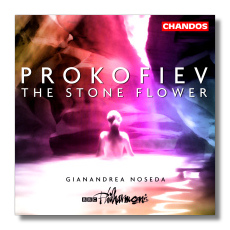
The Internet's Premier Classical Music Source
Related Links
- Prokofieff Reviews
- Latest Reviews
- More Reviews
-
By Composer
-
Collections
DVD & Blu-ray
Books
Concert Reviews
Articles/Interviews
Software
Audio
Search Amazon
Recommended Links
Site News
 CD Review
CD Review
Serge Prokofieff

The Stone Flower, Op. 118
BBC Philharmonic Orchestra/Gianandrea Noseda
Chandos CHAN10058 2CDS 148:19
This is the last of the evening-length ballets Prokofieff wrote in the Soviet Union. Although he completed it, to the degree that his works were allowed to be "finished' in Stalin's USSR, he did not live to see it performed, because of the harassment and virtual blacklisting Prokofieff had experienced since the official denunciation of his music in 1948. It was finally produced the year following his – and Stalin's – death. A production was in fact underway while he lived but objections were made to some of the music, notably concerning the dissonances he used to accompany the villain of the piece. Aside from those, this is just about the most consonant and least jarring of all his scores. He even incorporated some of the music he had written expressly for children. And the scenario was based on a fairytale fantasy, The Malachite Box, by Pavel Bazhov. But there were limits to what Prokofieff could bring himself to do.
The music is characteristically that of Prokofieff: melodic, brilliantly and sparingly scored, sometimes reminiscent of Tchaikovsky or Rimsky-Korsakoff but usually not. Although, as often with Prokofieff, he recycles some of his old material, in the main this music is fresh and newly inventive. I find the music pleasurable and engaging. If you like Prokofieff's later music, such as Cinderella, I think you will enjoy this also. Because of the length of the ballet, I found it best to pause it between each of the four acts. There are nine scenes, in addition to a Prologue and (brief) Epilogue, with 46 numbers in all. Many of the numbers, and some of the scenes are played without pause, as one might expect in a work for the stage. I also found it helpful to follow the descriptions of the scenes and numbers, because the changes in character of the music made more sense that way. I won't summarize the action but there is dramatic tension from more than one source, all nicely resolved by the end.
The performance and recording leave nothing to be desired, to my mind and ears. I have heard the Rozhdestvenskii Bolshoi recording from the 1960's, which has been reissued at various times, including a 1999 CD, but I am not "imprinted" on it, and I do not feel a need to go back and make a one on one comparison. My memory tells me that this performance compares favorably with that, and the 2003 sound is surely better. There is also a video of Grigorovich at the Maryinsky in St. Petersburg; and a CD by Urovskii and the Hannover Rundfunkorchester, neither of which I am familiar with.
Copyright © 2004, R. James Tobin


















